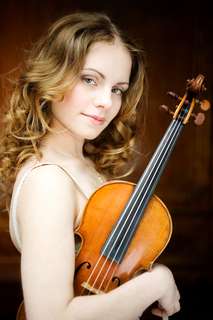|
Back
Sanderling with Russian fare Zurich
Tonhalle
06/02/2010 - & June 3, 2010
Dmitri Shostakovich: Violin Concerto No. 1
Pjotr Tschaikowsky: Symphony No. 1
Julia Fischer (violin)
Tonhalle-Orchester Zürich, Michael Sanderling (conductor) 
J. Fischer
Shostakovich’s First Violin Concerto is neither an easy piece for the soloist nor for the listener. Written at a time when Shostakovich was under pressure from the authorities, it lay in the drawer for seven years before receiving its first performance, the composer having been forced to make changes to pacify his governmental superiors.
Julia Fischer told us, in the excellent post-concert talks which the Tonhalle invariably organise, that she is the child of parents from Communist countries and surprisingly she grew up without typically Soviet composers such as Prokofiev and Shostakovich - which her parents avoided. Now, after listening to his symphonies (she tours with Yaacov Kreizberg) and reading the literature, she understands what is behind the notes. The technical difficulties are however such that the soloist must concentrate on those tricky notes themselves, keeping in time with the orchestra, and then finishing together. Julia Fischer admirably succeeded here on all those counts.
In the first movement Nocturne Fischer played both with lightness (but no lack of depth) and agility. She found the wit in the grotesque and demonic Scherzo. Whilst not in the class of Repin, Vengerov or Oistrakh (the work’s dedicatee), Fischer impressed throughout and threw in a gentle Bach Sarabande as an encore.
Tchaikovsky's first three symphonies have never been as popular as his last three, but the former are all sparkling works with much to recommend them. His First Symphony nicknamed Winter Daydreams, which depicts a Russian landscape in winter, may not be as polished as his later works, but it is charming and tuneful.
Sanderling, as his father Kurt before him, is becoming something of a specialist in Russian works. Kurt Sanderling emigrated in 1935 from Berlin to Russia and stayed there until 1960 (befriending Shostakovich during his stay) before returning to East Berlin.
Kurt Sanderling never learned conducting, and he eschewed the use of a baton. His hands flapped around and he sometimes whistled during the music. His son has a much more classic style but is clearly charismatic and knowledgeable in this music.
Sanderling’s broad sweeping gestures in the opening Allegro tranquillo brought out the best in the Tonhalle’s strong sections, whilst Michael Reid’s clarinet charmed. It was then the turn of the oboeist Isaac Duarte to impress in the Adagio cantabile with his fine craft. Sanderling brought the lilting dance rhythms of the ballet-like beauty of the Scherzo to the fore before the Finale where Sanderling favoured long pauses to heighten dramatic impact. He employed virtually inaudible pianissimos rising to nigh ear-splitting fortissimos. Then with its crashing cymbals, energetic timpani, blazing brass fanfares Sanderling brought the work to a typically Russian close.
John Rhodes
|